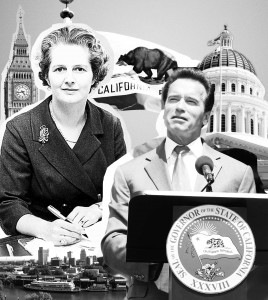British lessons for California
“For the first time since Margaret Thatcher handbagged the world in 1979, Britain looks like the West’s test-tube,” theorizes The Economist in its recent cover article, titled “Radical Britain.”
The publication is right — the United Kingdom is currently the best example of what the United States, and California in particular, can do to overcome its most pressing economic problems. It is important for Californians to pay attention to the experiments underway across the pond, note the results and then consider adding governmental reform to tea, the steam engine, English and the rest of the laundry list of notable things we have copied from the British.
A few months ago, the United Kingdom’s elections resulted in a coalition government composed of the Conservative Tories and center-left Liberal Democrats. Led by the young Conservative David Cameron, this choice in government represented a shift in British politics tantamount to the one marked by President Barack Obama’s election in the United States.
Some key background informations: For 13 years, the left-wing Labour Party led the United Kingdom. Tony Blair was elected prime minister in 1997 as the head of “New Labour,” which sought to govern from the center in order to appeal to the largely moderate British electorate. Blair was a hugely successful politician and became Labour’s longest-serving prime minister.
As with all ruling parties, however, Labour’s popularity eventually faded. Blair resigned as prime minister in 2007 to be replaced by his less telegenic chancellor, Gordon Brown. An expenses scandal in Parliament last year, in which several military personnel were discovered to have charged extravagances like vacation homes to the state, further deteriorated the public’s perception of Brown’s leadership abilities. Finally, Labour’s inability to address the United Kingdom’s multiple problems, especially government debt, led to its downfall in the 2010 elections.
Since then, the “Con-Lib” coalition has brought new energy to British government, transforming the country from a laggard to a leader in addressing the dilemmas faced by most Western democracies.
Thirteen years of Labour, combined with the recent financial crisis, have put the United Kingdom in a fiscal squeeze. Public spending made up a sky-high 51 percent of gross domestic product in 2009, while government revenues amounted to only 40 percent. This year, the deficit is forecast to be the highest among G-20 economies. However, to rectify this situation by enacting either dramatic spending cuts or tax raises would mean risking the United Kingdom’s recovery from its worst recession in decades.
Further the British are generally dissatisfied with the results of government spending. Education, police, welfare and the health service are all causes of discontent in the electorate, as too much bureaucracy has compromised the delivery of these essential public services.
Notably, one could write almost the exact same two paragraphs about California.
However, Cameron’s government has done more to tackle these problems in its first 100 days than the governator has in his whole term (though Cameron has yet to cameo in a blockbuster movie while in office, so at least we have that).
In June, the chancellor of the exchequer revealed a budget that shrinks most government departments by one quarter. Some taxes were also raised, but it is mostly spending cuts that now have the United Kingdom on track to be running a current budget surplus by 2014-2015.
In the meantime, Cameron is radically overhauling the British state through a policy of decentralization. Like the United States, the United Kingdom is a highly centralized country, with central government spending making up more than half of total public expenses. Cameron’s government is giving power away in an attempt to change this and improve services like education. In particular, it plans to rely on public participation to replace government supervision, such as allowing “free schools” overseen by nonprofits or parents, giving each district the power to elect its own police commissioner and giving private doctors the power to oversee the public health system.
Effective as it may be, this dual revolution — fiscal tightening combined with decentralizing government — runs two major risks. First, it risks jeopardizing the United Kingdom’s economic recovery. Second, it risks even further deterioration of public services if public participation flops and budgets have been slashed too low. However, it also represents an attempt at problem solving that is bold enough to actually work.
California has yet to take such steps. But we now have the luxury of being able to observe a live “test trial” in a place of similar size and with similar problems to our state.
Soon there will be a new governor; whomever it is should keep an eye on what happens in the next few months in the United Kingdom. If Cameron’s gambles start paying off, the next governor should swallow his or her pride and engage in the sincerest form of flattery: imitation.
Daniel Charnoff is a senior majoring in international relations (global business).

